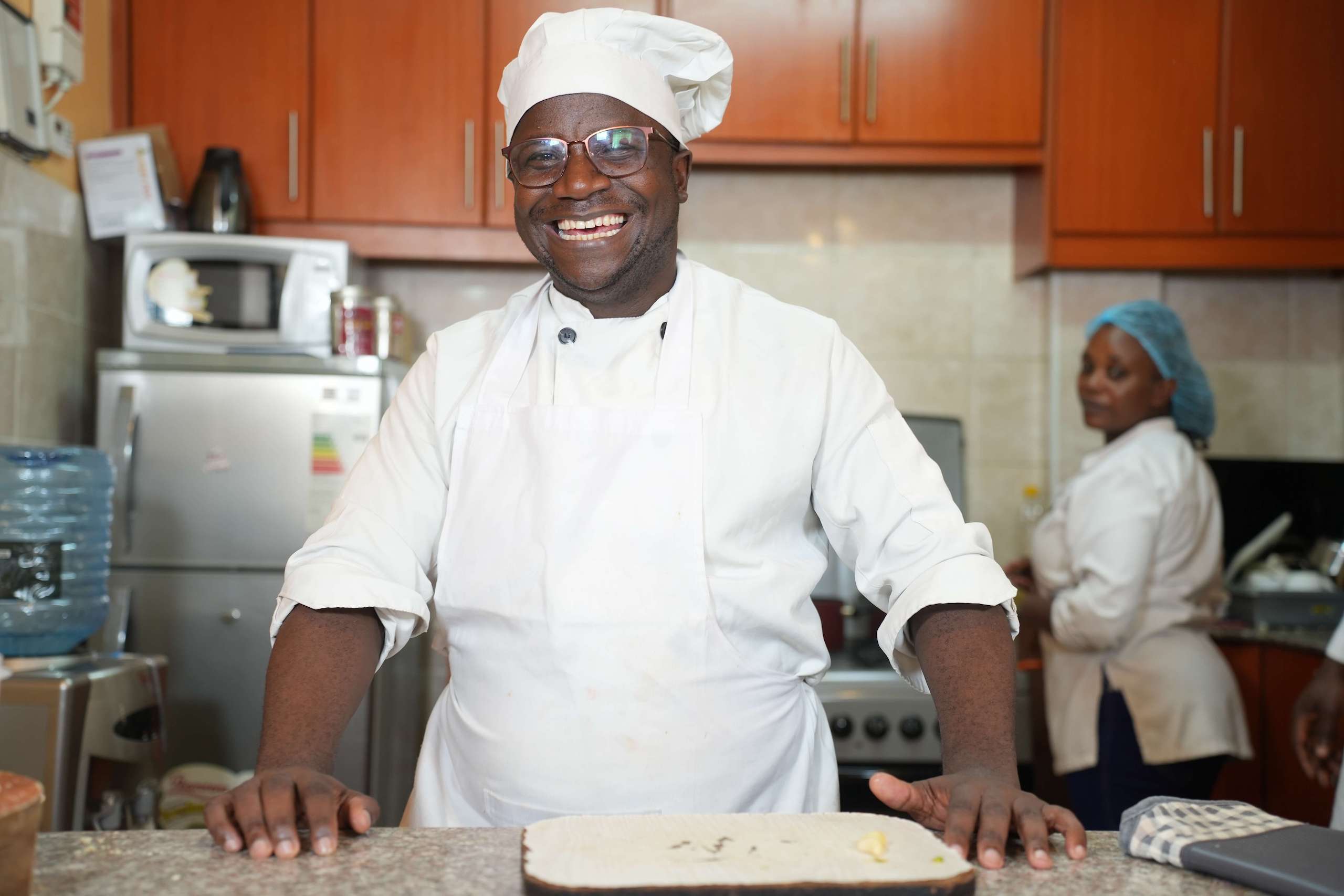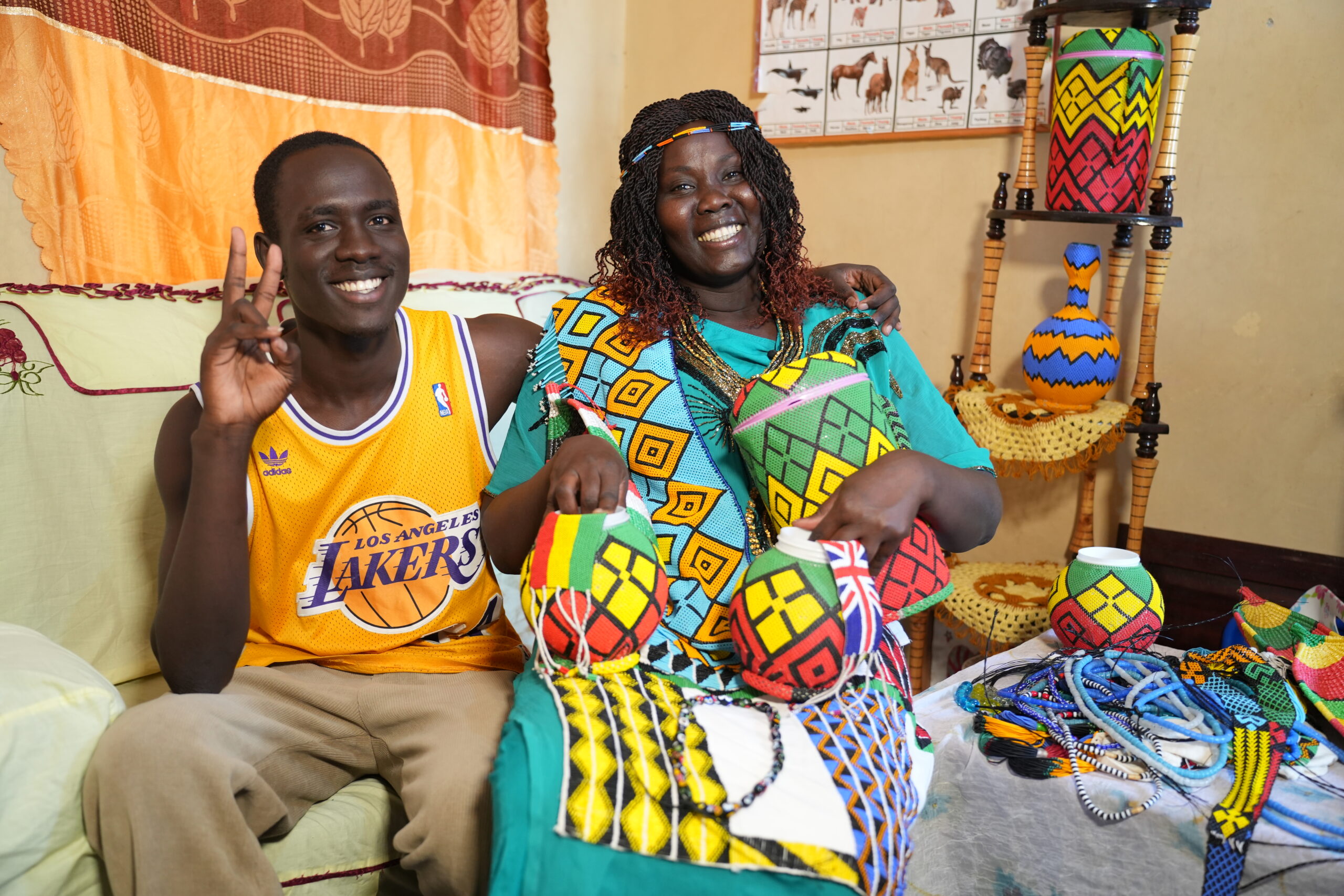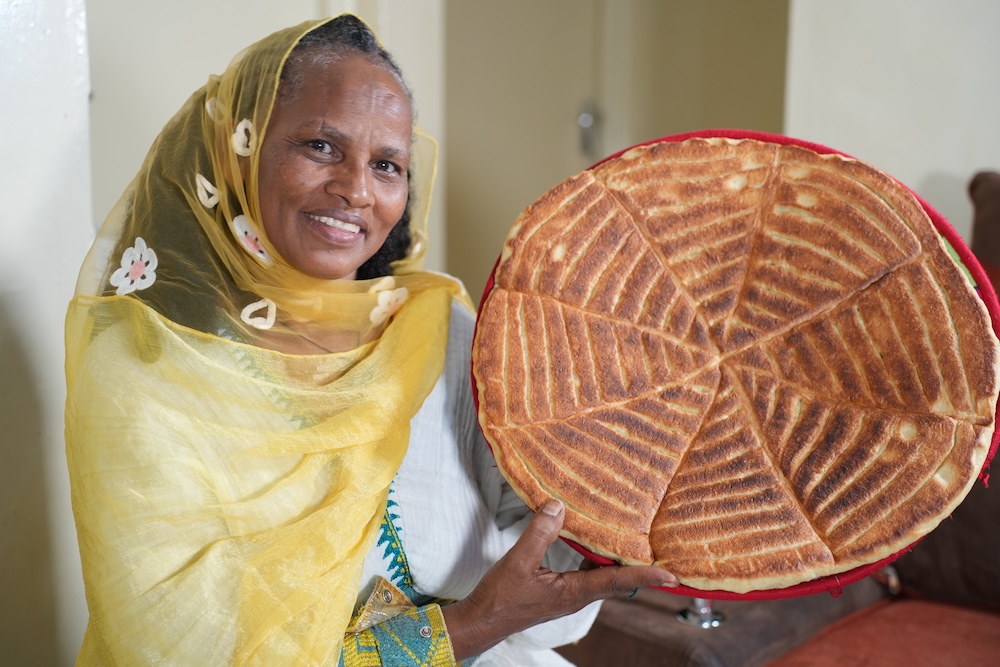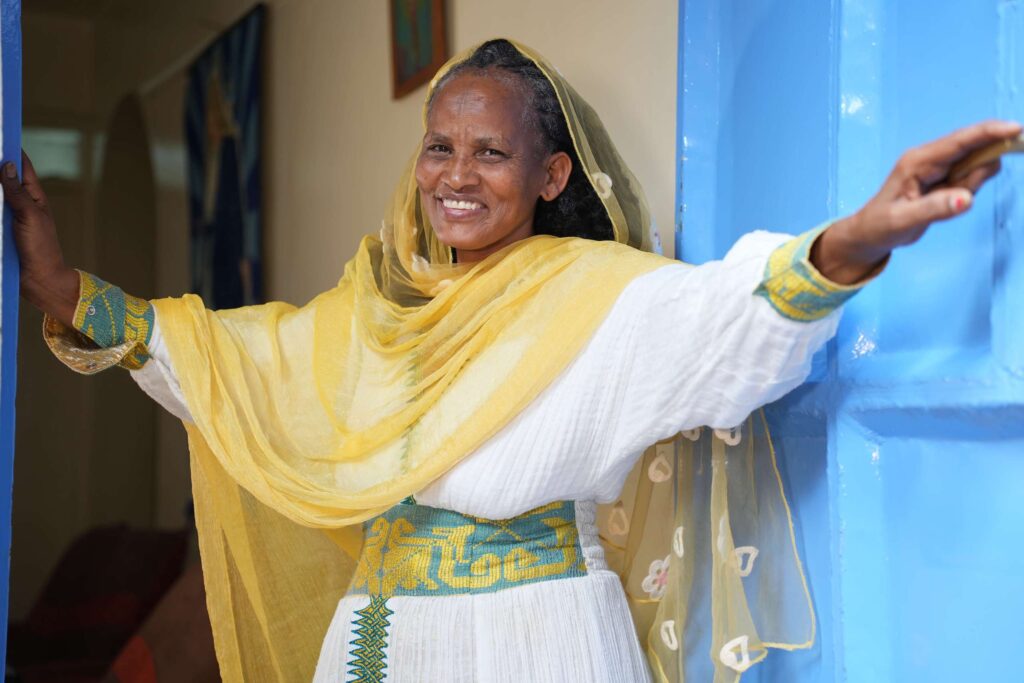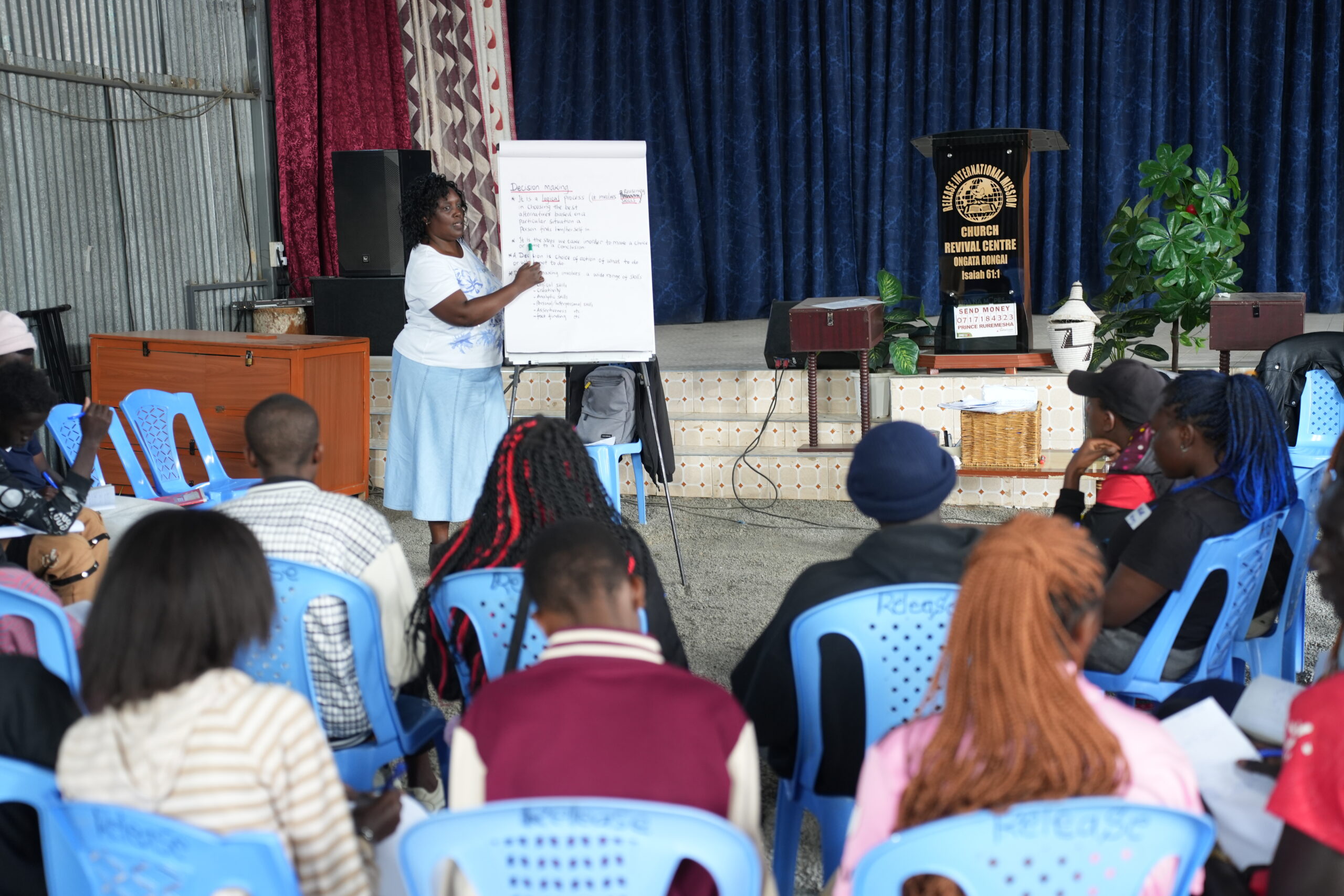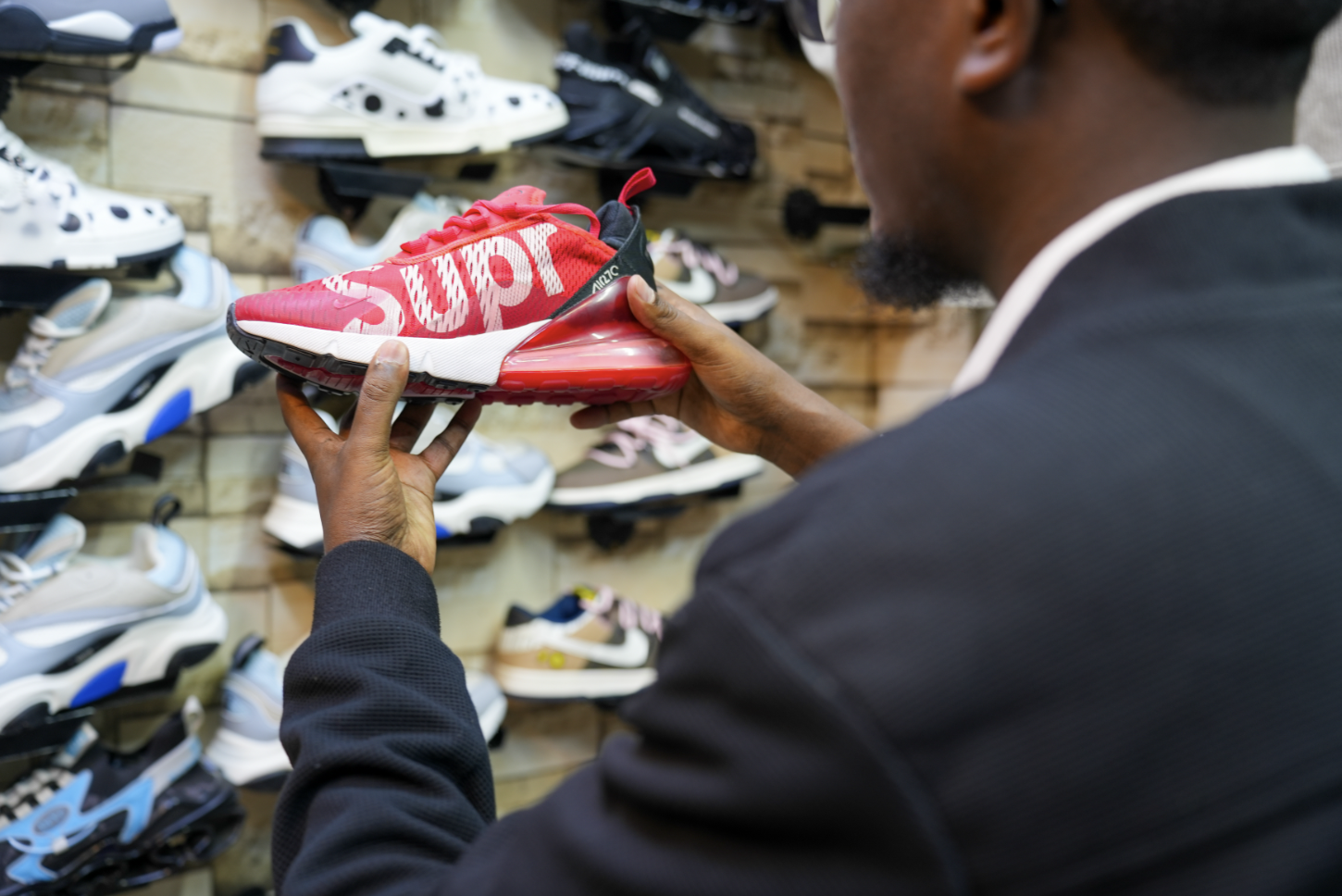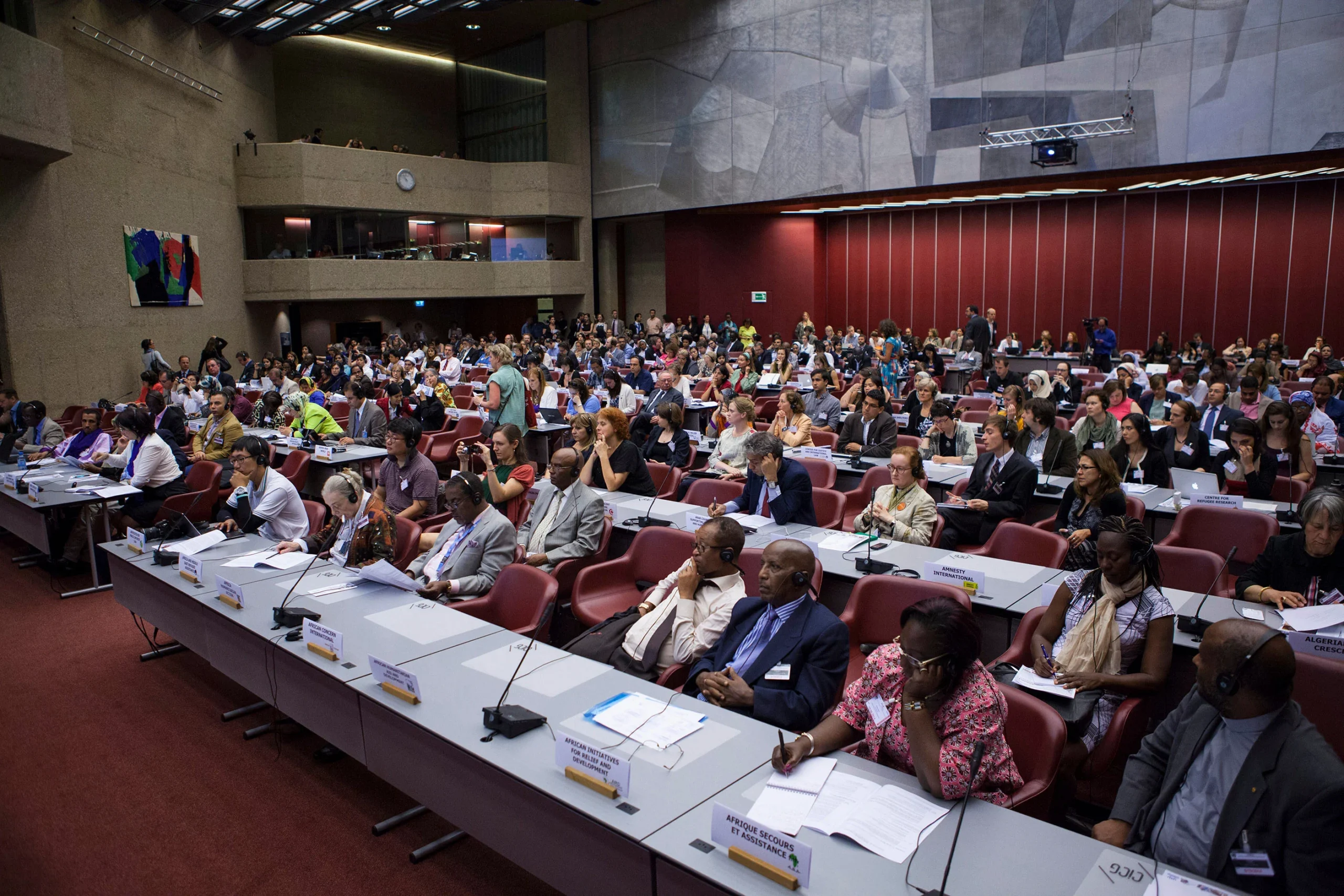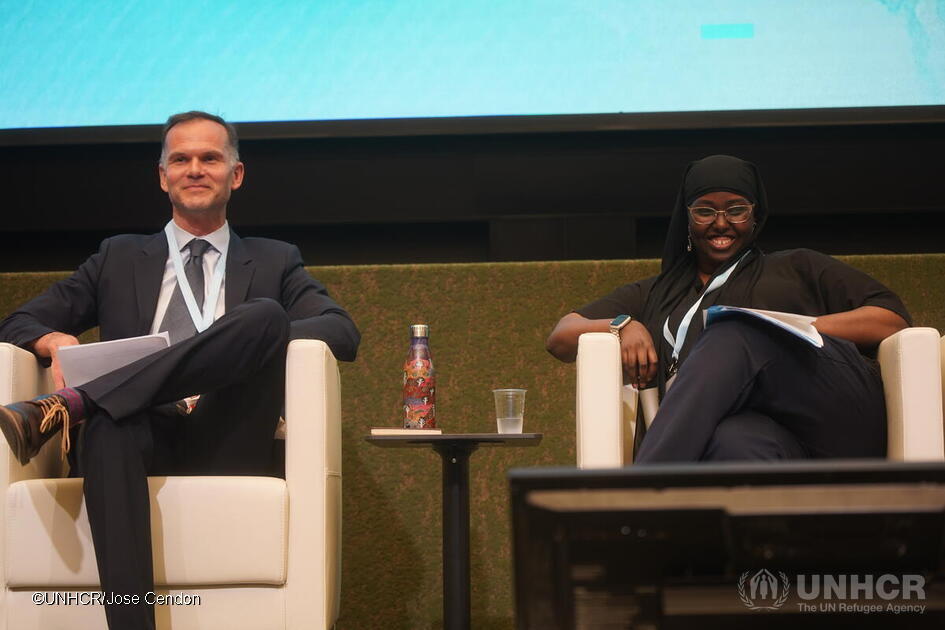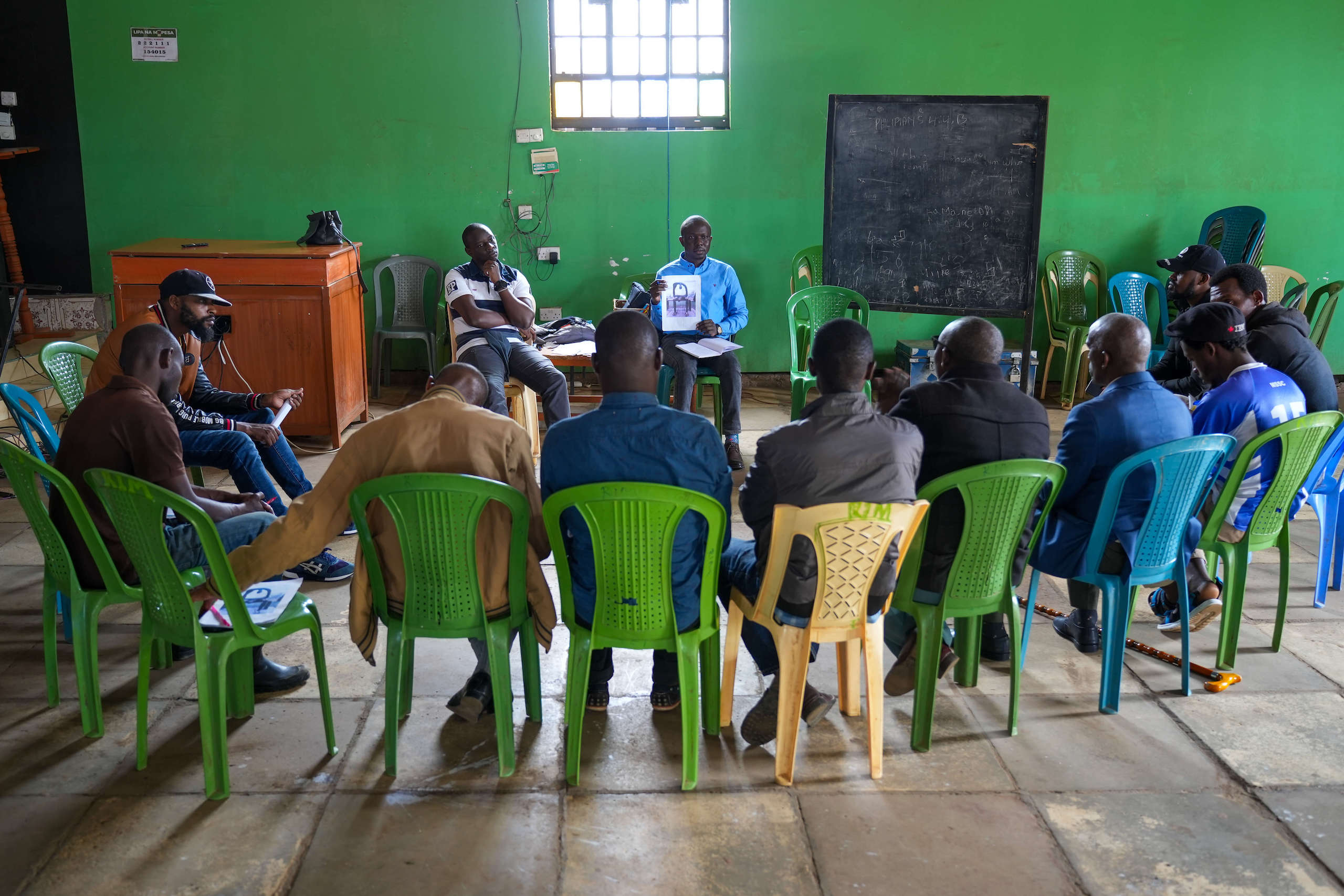
by Nicholas Mbata, James Nanzala Nyangule, Jacinta Mutie, Patrick Guyer
After a few months of group and individual mental health counseling, Philippe*, a refugee from the Democratic Republic of Congo (DRC) began to notice a decline in his symptoms of depression, stress and anxiety. Philippe, a young single father, was forced to flee his home due to violence and sought protection in Kenya.
Fleeing his home and building a new life in Kenya presented Philippe with countless challenges. Even in Kenya, with his worst security fears behind him, the rigors of work in the construction sector,struggles with the cost of living, and health issues added to the heavy memories he brought with him from fleeing the DRC.
All this took a toll on Philippe’s mental health. Seeking help from RefugePoint, Philippe was invited to join a refugee support group, followed by individual counseling. Through support from counselors and other refugees, Philippe found a sense of community and learned about self-awareness and strategies to help him cope with—and even reduce—the symptoms he struggles with.
Philippe is just one of 432 refugees who sought counseling support from RefugePoint starting in 2022 through our office in Nairobi, Kenya. Despite the heavy burden of symptoms of trauma, depression and anxiety that many refugees struggle with, evidence from RefugePoint’s Mental Health and Psychosocial Support (MHPSS) program shows that counseling can help many of them move toward symptom alleviation and a better quality of life. This article showcases RefugePoint’s counseling work and recent evidence about what can change for refugees who participate in these services.
Invisible scars
According to the WHO, around one in eight people live with a mental health condition. Among refugees like Philippe, the prevalence is almost certainly higher, as the flight from a home country and the hardships of navigating life in a new country adds incredible strain and hardship for many.
Among refugees in Nairobi served by RefugePoint, symptoms of anxiety, depression and post-traumatic stress are common. Other issues that bring clients to counseling at RefugePoint include grief, parenting, family conflicts, financial stress, and medical issues.
RefugePoint takes a trauma-informed approach to working with refugees on their mental health challenges. A trauma-informed approach recognizes the widespread impact of trauma and potential paths to recovery, screens clients for symptoms of trauma, and integrates knowledge of trauma into counseling services.
Our counselors offer one-on-one counseling to individuals, spouses, families and children. For clients with symptoms of depression or trauma, we offer therapy groups that last for twelve sessions. For others who face a mix of challenges, support groups offer a chance to build connections, strengthen peaceful coexistence and learn about healthy coping skills. Teenagers and young adults benefit from life skills training designed to build and strengthen their interpersonal and problem-solving skills.
Counseling and reducing symptoms of mental health challenges
Our team was curious to know: how do the counseling services we offer impact the mental health symptoms refugees struggle with? To find answers, we analyzed data from four different assessment tools that our Counseling team used with refugee clients at the start and end of their counseling sessions for those who started receiving services in 2022.
The tools included:
- The Tree of Self-Awareness for clients in support groups
- The Patient Health Questionnaire (PHQ-9), an assessment of depression symptoms used with clients in group therapy
- The Post Traumatic Stress Disorder (PTSD) Checklist, an assessment of traumatic stress symptoms, also used with clients in group therapy
- The Individual Intake form for individual counseling clients, including crisis counseling
Our analysis of assessment data showed that most clients assessed using the Tree of Self-Awareness, PHQ-9, and PTSD Checklist showed improvements in symptoms (74%, 80%, and 82%, respectively) meaning at least a marginal lessening of symptoms compared to their score at intake.
In contrast, most clients (63%) assessed using the Individual Intake forms reported increased severity of symptoms at exit compared to intake. The figure below summarizes these findings:
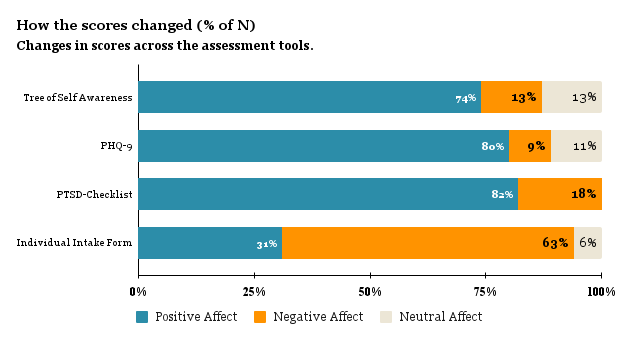
The number of clients assessed varied per tool. Roughly 100 clients were assessed with the Individual Intake form and the Tree of Self-Awareness, and fewer than 40 clients assessed for the PHQ-9 and PTSD Checklist respectively.
Different clients were assessed using different tools, depending on the type of services they received. We carefully compared changes in the data using statistical tests to ensure that changes over time in the scores for all four tools were statistically significant, at standard levels (p < 0.05). These details are summarized in the table below:

We also probed the data to explore the demographics of the refugees who provided these data. Across all four tools, a consistent majority (between 54% and 76%) of clients were female, followed by males (between 21% and 46%), and a smaller percentage identifying as non-binary (1% to 3%). The DRC was the most common country of origin, and adults aged 25 and above were the predominant age-group seeking counseling services.
Continuously improving our services and assessments
Trauma-informed counseling, support groups and group therapy can be a critical step along the path to recovery and self-reliance for refugees like Philippe. This analysis shows that most clients made gains in reducing symptoms of trauma and depression over time while engaged in support groups and group therapy offered by RefugePoint.
The Individual Intake Form, used for clients receiving individual counseling services, however shows an opposite trend, in which a majority of clients reported greater severity of symptoms at the end of counseling than they did at the outset.
An important caveat is that these assessments capture symptoms, and not diagnoses, of mental health conditions, which may be multiple and overlapping for some refugees. “Improvement” can also be subjective: reduced symptoms could speak to an improved state but may actually accompany an increase in illness for some cases. The trajectory of mental illness can also be unpredictable and non-linear, and a reduction in symptoms may be influenced by many factors in addition to counseling services received.
Still, it is encouraging to see that most refugees participating in support groups and group therapy report a reduction in symptoms over time. These results will help us further tailor our MHPSS offerings for the diverse refugee community we serve in Nairobi.
The less positive results on the Individual Intake form prompt some reflection. While this may seem to be an outlier, refugees receiving individual counseling are a different group than those in group sessions, with different challenges and needs. We will take a closer look at the validity and reliability of the Individual Intake assessment to ensure that it is consistently measuring what it is designed to measure.
We will also dig further into all four assessments to ensure that they work equally well across the languages spoken by refugees and staff in Nairobi. Whereas most clients completed the assessments in Kiswahili, some needed the help of an interpreter to complete the assessment in their first language(s). The language in which an assessment is done can influence the performance of the assessment and the result it produces. Hence, we plan to include the client’s language of assessment in all our assessment records to inform future analysis and validation of the tools.
Lastly, we will ensure that the voices of refugees come through clearly in these assessments, recognizing the importance of storied, qualitative data, by adding in open-ended prompts for feedback and comments in their own words in all assessments.
*name changed to protect confidentiality
Cover: James Nanzala Nyangule, a RefugePoint Mental Health Counselor, leads a men’s group therapy session in Nairobi, Kenya (Photo: Jessica Masibo, RefugePoint)

by Nicholas Mbata, James Nanzala Nyangule, Jacinta Mutie, Patrick Guyer
After a few months of group and individual mental health counseling, Philippe*, a refugee from the Democratic Republic of Congo (DRC) began to notice a decline in his symptoms of depression, stress and anxiety. Philippe, a young single father, was forced to flee his home due to violence and sought protection in Kenya.
Fleeing his home and building a new life in Kenya presented Philippe with countless challenges. Even in Kenya, with his worst security fears behind him, the rigors of work in the construction sector,struggles with the cost of living, and health issues added to the heavy memories he brought with him from fleeing the DRC.
All this took a toll on Philippe’s mental health. Seeking help from RefugePoint, Philippe was invited to join a refugee support group, followed by individual counseling. Through support from counselors and other refugees, Philippe found a sense of community and learned about self-awareness and strategies to help him cope with—and even reduce—the symptoms he struggles with.
Philippe is just one of 432 refugees who sought counseling support from RefugePoint starting in 2022 through our office in Nairobi, Kenya. Despite the heavy burden of symptoms of trauma, depression and anxiety that many refugees struggle with, evidence from RefugePoint’s Mental Health and Psychosocial Support (MHPSS) program shows that counseling can help many of them move toward symptom alleviation and a better quality of life. This article showcases RefugePoint’s counseling work and recent evidence about what can change for refugees who participate in these services.
Invisible scars
According to the WHO, around one in eight people live with a mental health condition. Among refugees like Philippe, the prevalence is almost certainly higher, as the flight from a home country and the hardships of navigating life in a new country adds incredible strain and hardship for many.
Among refugees in Nairobi served by RefugePoint, symptoms of anxiety, depression and post-traumatic stress are common. Other issues that bring clients to counseling at RefugePoint include grief, parenting, family conflicts, financial stress, and medical issues.
RefugePoint takes a trauma-informed approach to working with refugees on their mental health challenges. A trauma-informed approach recognizes the widespread impact of trauma and potential paths to recovery, screens clients for symptoms of trauma, and integrates knowledge of trauma into counseling services.
Our counselors offer one-on-one counseling to individuals, spouses, families and children. For clients with symptoms of depression or trauma, we offer therapy groups that last for twelve sessions. For others who face a mix of challenges, support groups offer a chance to build connections, strengthen peaceful coexistence and learn about healthy coping skills. Teenagers and young adults benefit from life skills training designed to build and strengthen their interpersonal and problem-solving skills.
Counseling and reducing symptoms of mental health challenges
Our team was curious to know: how do the counseling services we offer impact the mental health symptoms refugees struggle with? To find answers, we analyzed data from four different assessment tools that our Counseling team used with refugee clients at the start and end of their counseling sessions for those who started receiving services in 2022.
The tools included:
- The Tree of Self-Awareness for clients in support groups
- The Patient Health Questionnaire (PHQ-9), an assessment of depression symptoms used with clients in group therapy
- The Post Traumatic Stress Disorder (PTSD) Checklist, an assessment of traumatic stress symptoms, also used with clients in group therapy
- The Individual Intake form for individual counseling clients, including crisis counseling
Our analysis of assessment data showed that most clients assessed using the Tree of Self-Awareness, PHQ-9, and PTSD Checklist showed improvements in symptoms (74%, 80%, and 82%, respectively) meaning at least a marginal lessening of symptoms compared to their score at intake.
In contrast, most clients (63%) assessed using the Individual Intake forms reported increased severity of symptoms at exit compared to intake. The figure below summarizes these findings:

The number of clients assessed varied per tool. Roughly 100 clients were assessed with the Individual Intake form and the Tree of Self-Awareness, and fewer than 40 clients assessed for the PHQ-9 and PTSD Checklist respectively.
Different clients were assessed using different tools, depending on the type of services they received. We carefully compared changes in the data using statistical tests to ensure that changes over time in the scores for all four tools were statistically significant, at standard levels (p < 0.05). These details are summarized in the table below:

We also probed the data to explore the demographics of the refugees who provided these data. Across all four tools, a consistent majority (between 54% and 76%) of clients were female, followed by males (between 21% and 46%), and a smaller percentage identifying as non-binary (1% to 3%). The DRC was the most common country of origin, and adults aged 25 and above were the predominant age-group seeking counseling services.
Continuously improving our services and assessments
Trauma-informed counseling, support groups and group therapy can be a critical step along the path to recovery and self-reliance for refugees like Philippe. This analysis shows that most clients made gains in reducing symptoms of trauma and depression over time while engaged in support groups and group therapy offered by RefugePoint.
The Individual Intake Form, used for clients receiving individual counseling services, however shows an opposite trend, in which a majority of clients reported greater severity of symptoms at the end of counseling than they did at the outset.
An important caveat is that these assessments capture symptoms, and not diagnoses, of mental health conditions, which may be multiple and overlapping for some refugees. “Improvement” can also be subjective: reduced symptoms could speak to an improved state but may actually accompany an increase in illness for some cases. The trajectory of mental illness can also be unpredictable and non-linear, and a reduction in symptoms may be influenced by many factors in addition to counseling services received.
Still, it is encouraging to see that most refugees participating in support groups and group therapy report a reduction in symptoms over time. These results will help us further tailor our MHPSS offerings for the diverse refugee community we serve in Nairobi.
The less positive results on the Individual Intake form prompt some reflection. While this may seem to be an outlier, refugees receiving individual counseling are a different group than those in group sessions, with different challenges and needs. We will take a closer look at the validity and reliability of the Individual Intake assessment to ensure that it is consistently measuring what it is designed to measure.
We will also dig further into all four assessments to ensure that they work equally well across the languages spoken by refugees and staff in Nairobi. Whereas most clients completed the assessments in Kiswahili, some needed the help of an interpreter to complete the assessment in their first language(s). The language in which an assessment is done can influence the performance of the assessment and the result it produces. Hence, we plan to include the client’s language of assessment in all our assessment records to inform future analysis and validation of the tools.
Lastly, we will ensure that the voices of refugees come through clearly in these assessments, recognizing the importance of storied, qualitative data, by adding in open-ended prompts for feedback and comments in their own words in all assessments.
*name changed to protect confidentiality
Cover: James Nanzala Nyangule, a RefugePoint Mental Health Counselor, leads a men’s group therapy session in Nairobi, Kenya (Photo: Jessica Masibo, RefugePoint)
